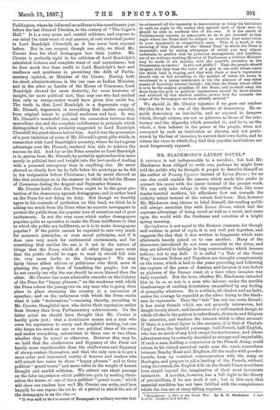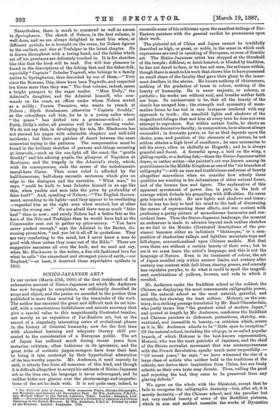BLACKMORE'S LATEST NOVEL,
A PREFACE is not indispensable to a novelist; but had Mr. Blackraore been obliged to write one, perhaps he might have told the public why he thought it proper to describe himself as the author of Tommy Uproots instead of Lorna Doone ; for no one else could explain the reasons which made him prefer to connect his name with the lesser instead of the greater work. We can only take refuge in the supposition that, like some tender-hearted mothers, his affections flow out towards the ricketty infant instead of the robust firstborn. But, however Mr. Blackmore may choose to label himself, the reading public will always associate him with Lorna Dome, which had the supreme advantage of being novel as well as a novel, and came upon the world with the freshness and sunshine of a bright spring morning.
Sprimphaveri is not equal to the Exmoor romance, for though well written in point of style, it is not well put together, and suggests the idea that it was written in fragments which were afterwards loosely joined on to one another. Many of the characters introduced do not seem essential to the story, and they are allowed to indulge in long conversations which become tedious, not to say dull. It is called "a Tale of the Great War," because Nelson and Napoleon are brought conspicuously on the scene, which is laid in the years preceding and following the rapture of the peace of Amiens, and because it sets before us pictures of the Sussex coast at a time when invasion was daily expected. Bat the hero, whether Mr. Blackmore intended him to be so or not, is a man who labours under the terrible disadvantage of exciting detestation unqualified by any feeling of sympathy whatever. He is a villain, all shadow and no light, unless his courage be regarded as the silver lining to the black- ness he represents. Then the "tale" has not one main thread; it has many threads which are not properly interwoven, but dangle loosely about; and the absence of a well-marked design, to which all else in the pattern is subordinate, distracts and fatigues the attention, and weakens the interest which is often aroused. If there is a central figure in the romance, it is that of Captain Caryl Caine, the hateful personage, half-French, half-English, who has no merit of any kind except his fearlessness, and whose adventures may be correctly described as strange and improbable. If such a man, holding a commission in the French Army, could return to his rained ancestral castle near the coast, somewhere between Beachy Head and Brighton, fill the vaults with powder. barrels, keep up constant communication with the camp at Boulogne, and prepare to aid a landing of the French, without being discovered, the English folk on the South Coast must have been stupid beyond the imagination of their most inveterate detractors. A novelist, however, has a fall right to his theory of probabilities, if he can work it out ; but in this case, that essential condition has not been fulfilled with the completeness which the fine art of story-telling requires.
• Spriagharat a To'. of the Great War. By R. D. Blaokawre. 3 vole. Union Sampson Low and Co. Nevertheless, there is mach to commend as well as amuse in Springhaven. The sketch of Nelson, in the first volume, is well done, and we are always delighted to meet him when, at different periods, he is brought on the scene, for Nelson figures in the earliest, and dies at Trafalgar in the latest chapter. He is drawn throughout with a loving hand, and the foibles which set off his greatness are delicately touched in. It is for sketches like this that the book will be read. Nor will less pleasure be found in the descriptions of the fishing fleet and the fisher-folk, especially" Captain" Zebedee Tugwell, who belongs to a family native to Springhaven, thus described by one of them,—" Ever since the Romans, Dan, there have been Tagwells, and respected ten times more than they was." The first volume, indeed, opens a bright prospect to the eager reader. "Miss Dolly," the Admiral's daughter, and the Admiral himself, who com- mands on the coast, an officer under whom Nelson served as a middy; Parson Twemlow, who wants to preach at Nelson ; Myth Scudamore, otherwise "Captain Scuddy," as the schoolboys call him, for he is a young sailor whom " the peace" has drifted into a grammar-school ; and Faith, Dolly's sister, all promise well for the exacting reader. We do not say that, in developing his tale, Mr. Blackmore has not strewed his pages with admirable chapters and well-told incidents ; but there are patches of desert between the oases somewhat trying to the patience. The compensation must be found in the brilliant sketches of persons and things occurring at intervals,—such as the sea.fight off the coast, the "gentle Scuddy" and his adoring pupils, the glimpses of Napoleon at Boulogne, and the tragedy in the Admiral's study, which, with its consequences, ends the career of the melodramatic rascal-hero Came. Then some relief is afforded by the half-humorons, half-sharp sarcastic sentences which give an edge to the dialogues and the narrative. "What man," he says, "could be built to beat Zebedee himself in an age like this, when yachts and men take the prize by profundity of false keel P" And, speaking of Nelson,—"The English Govern- ment, according to its lights—and they appear to be everlasting —regarded him as the right man when wanted, but at other times the wrong one." We are afraid there was as much "false keel" then as now ; and surely Nelson had a better fate as the hero of the Nile and Trafalgar than he would have had as the Commander sent out to gather up prize-money. "You have never pushed enough," says the Admiral to the Rector, dis- cussing promotion, "and you let it all off in quotations. They are very comforting to the mind, but I never knew a man do good with them unless they come out of the Bible." There are suggestive sarcasms all over the book, and we need not say, when Mr. Blackmore is the writer, a fine old-fashioned love for what he calls "the staunchest and strongest piece of earth,—our England,"—at least, it deserved those superlative epithets in 1803.



































 Previous page
Previous page